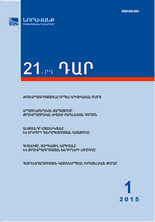 04.03.2015
04.03.2015
«21-րդ ԴԱՐ» No. 1, 2015
![]() The issue No.1 of the «21-րդ ԴԱՐ» journal for 2015 has been published by Noravank Foundation.
The issue No.1 of the «21-րդ ԴԱՐ» journal for 2015 has been published by Noravank Foundation.
The issue is dedicated to the quite complicated demographic situation in the Republic of Armenia.
This is characterized as a primary challenge to the national security of Armenia. Materials of the issue cover problems of reducing the emigration and improving the demographic situation.
Subscription and on-line sale:
http://pressinfo.am/en/journal/armenian-information-analytical-magazine-21-st-century.html
Purchase: “Noravank” Foundation
Address: 23/1 Garegin Njdeh, Yerevan,
Phone:+374 10 44 04 73, +374 93 54 31 71
DEMOGRAPHY AS A CRITICAL AREA
Gagik Harutyunyan
Resume
The dire demographic situation in RoA should be perceived as a primary challenge to national security and a status of “critical” must be ascribed to this area. Alleviating migration and improving the demographic situation is possible only with special attention focused on establishment of technological “critical infrastructures” in the context of the development strategy.
INDUSTRIAL DEVELOPMENT AS A FACTOR FOR IMPROVEMENT OF THE DEMOGRAPHIC SITUATION AND ITS TRENDS IN ARMENIA
Samvel ManukyanResume
The article presents the demographic situation in Armenia in 2013 and its dynamic trends, based on which an estimate of Armenia’s population in 2030 is provided. The impacts of the country’s economic parameters, such as unemployment level, wages, satisfaction with family’s financial situation and annual GDP growth on the population migration balance and reproductive behavior were assessed. In the framework of a geo-systemic analysis the industrial policy of the country and the importance of its nature for changing the demographic situation in Armenia are demonstrated.
ALEXANDER MYASNIKYAN AND THE ESTABLISHMENT OF THE SECOND REPUBLIC
Avag HarutyunyanResume
Alexander Myasnikyan was concerned with the destiny of Soviet Armenia and the newly emerged Diaspora, and he was an exceptional leader in Transcaucasia and USSR, who could solve problems in the region because of the position he occupied. He lavished care and attention upon people of literature and art and attached great importance to the development of the education system. As one of the founders of Soviet Armenian statehood, he focused much of his attention on the political destiny of Armeniancy, living arrangements for refugees and organizing repatriation. Myasnikyan is the founder of Diaspora Studies in Soviet Armenia.
MODERNIZATION, SCIENCE, KNOWLEDGE, HUMAN CAPITAL AND SOLUTIONS TO THE DEMOGRAPHIC PROBLEMS: THE EXPERIENCE OF THE REGIONAL COUNTRIES
Sevak SarukhanyanResume
The article uses the examples of Iran and Saudi Arabia to review the experience of national strategies modernization for development in the countries of the region, as well as the importance of education and science in implementation such strategies. Issues related to the patterns of Islamic revolution in Iran are discussed, along with proportions of progressive and regressive trends between the periods of the Shah’s rule and “white revolution”. The same issues are reviewed for Saudi Arabia with particular emphasis on the lack of development of liberal arts in this country, and at the same time promotion of scientific research in technologies and exact sciences as one of the vectors of “Saudization”.
THE ISRAELI EXPERIENCE OF ORGANIZING REPATRIATION
Karen VeranyanResume
The article reviews the main mechanisms and activities for repatriation of Jews organized by the State of Israel and their socio-cultural, societal integration in Israel. The article also presents the programs implemented and privileges granted by the government, which facilitate smooth integration of returnees in the public life of the country.
INDUSTRIAL INNOVATION POLICY OF ARMENIA AS THE BASIS TO IMPROVE ITS COMPETITIVENESS
Ashot TevikyanResume
The article discusses the need for economic policy involving a sophisticated internal mechanisms and institutions to ensure the development, with a focus on innovation and industrial development along with the extensive cooperation with leading companies of the EEU, which would increase the country's competitiveness and contribute to its economic development.
RESEARCH AND DEVELOPMENT ACTIVITIES IN THE SOUTH CAUCASUS COUNTRIES: A STATISTICAL ANALYSIS
Karen VeranyanResume
The scientific and technological progress is an important, if not the most important prerequisite for economic development of any country. This objective of this study is to compare research and development activities of South Caucasus countries, explicate the major trends of the recent years and uncover the main problems in the area of research, development and technologies in our country based on analysis of quantitative and statistical data. It is expected to invite a deeper attention on prospects of science and its development in Armenia.
PUBLIC AND POLITICAL OPINION IN TURKEY CONCERNING THE SETTLEMENT OF THE ARMENIAN-TURKISH RELATIONS (2001-2007)
Davit SafaryanResume
International developments in the first decade of the 21st century, specifically the recognition and condemnation of the Armenian Genocide as well as ongoing discussions on this issue in a number of countries have brought up a problem for political elites in Turkey to adopt some new approaches to the Armenian Cause. Since 2002 when “Justice and Development” party came to power in Turkey, its leader and other key politicians started working out such approaches that would respond to the new realities, at the same time continuing the policy of the Genocide denial. As a new possibility for settling the Armenian-Turkish relations the policy of the European integration of Armenia and negotiations on Turkey’s admission to the EU were discussed. In April 2005 the President of Armenia R. Kocharyan and Prime Minister of Turkey R. T. Erdogan exchanged letters that gave rise to wide public and political debates in both countries. Since then the attempts of sincere reconsideration of their own history, along with a discourse on the Armenian Genocide at public forums and cautious consideration of the possibility of its recognition have started in Turkey.


